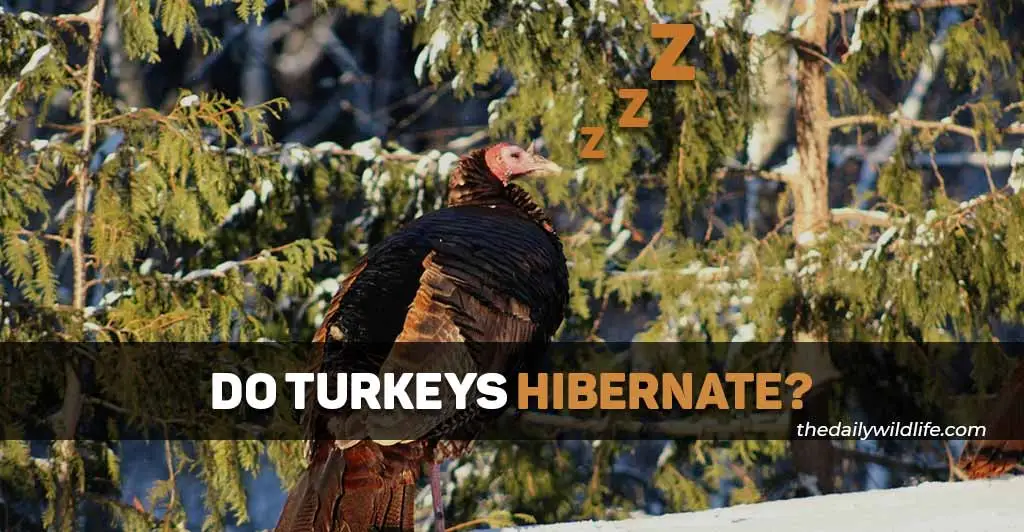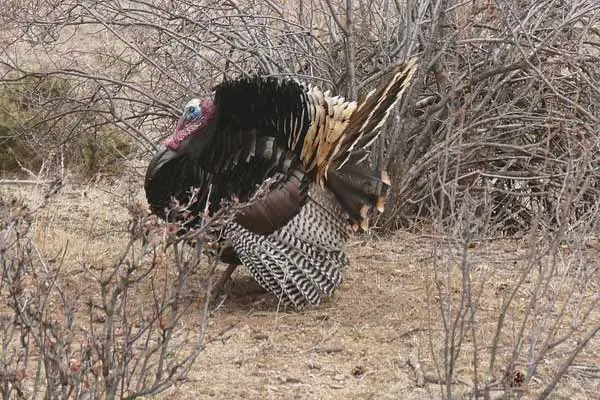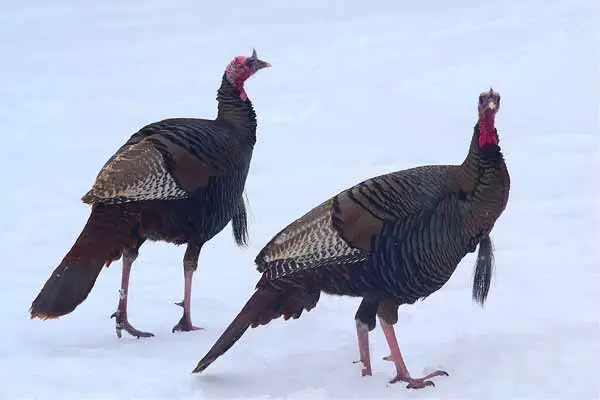Sometime before the year ends, the temperatures will drop. Snow will fall and cover the most of vegetation.
Some birds will migrate south to escape the harsh winter weather. Many mammals, fish, reptiles, and amphibians will turn to hibernation, deep sleep until the weather improves. Some wildlife might even die.
Since so many animals hibernate when it gets cold outside, many people wonder whether turkeys will do so too.
Turkeys do not hibernate during winter, nor do they migrate. Before the harsh winter months come, turkeys will build up a supply of fat to survive in the wild.
Around late October most of the summer birds are long gone; some birds like the wild turkeys stick around. With their leathery necks, resilient bodies, and odd gaits, these non-migratory birds manage to survive extended periods of extreme cold and snow.
Not all do, unfortunately.
If the winter is mild, 70-100% of turkeys will survive; during severe winters, only 50% of them stay alive.

Preparing For Winter
Wild turkeys prepare for winter by feeding madly throughout the summer and fall. During that period, they build up a supply of fat by eating available insects, fruits, nuts, berries, and other plants.
As the days grow shorter and the temperatures start dropping, the grasses where turkeys forage for insects and seeds start to slowly die off.

That’s why turkeys move from the roadsides and fields into the forests when the fall comes.
Besides their eating habits, the roost company changes too, as winter starts approaching. During spring and summer, hens and their poults are together day and night. As the fall comes, the poults will no longer roost in the same trees as their mothers during the night.
When the sun comes out, they will continue to feed together.
The main problem wild turkeys have with overfeeding is that they can’t become fat enough to make it through the winter. If they bulk up too much, they won’t be able to fly back to their roost.
Turkeys are arboreal birds that sleep in the trees during winter.
That’s why they will produce just enough fat to get them through short spells of severe winter weather.
Surviving The Winter Without Hibernating

Hibernation is a state of deep sleep an animal enters to conserve energy and survive when food is scarce and the temperature is too low. If there is no food around, the animal decides to drop its body temperature, heart rate, and breathing rate to extremely low levels to conserve energy.
Turkeys do not do so; when the temperature drops, wild turkeys’ metabolism increases and they need more food to survive (about 0.7 oz/day for every 18°F the temperature drops below 51.6°F).
So what happens to turkeys during winter?
When the winter comes, wild turkeys do not enter any dormant state like hibernation, they remain active. They also do not migrate and stay in their habitats.
During the day, as they are diurnal animals, turkeys will scratch through ground cover and leaf litter to find seeds, nuts, and dormant invertebrates.
For as longest as possible, they will continue to feed on mosses, buds, seeds, and fern spores; some will also scavenge man-made food supplies or manure piles.
One study on Merriam’s wild turkey discovered that this species will feed on pine seeds, kinnikinnicks, bluegrass, and corn from October to April.
Turkeys are generally tough animals that can manage the bitter cold. If the food is available, they can survive for long periods of harsh weather and snow. However, deep snow after a blizzard can cause some problems and limit the turkeys’ chances of survival.
Snow might become too deep to scratch for food. That’s why after heavy snow, wild turkeys will remain in their roosts for days. Thanks to their huge stockpile of fat, healthy turkeys can survive for extended periods without proper food and leaving their roost trees.
According to a paper by the Wisconsin government, turkeys can remain in roosting areas for up to 14 days when the weather is bad and can survive losing up to 40% of their body weight.
Advantages And Disadvantages Of Wild Turkeys Hibernating
If a turkey were to hibernate, the main benefit would be the ability to more easily survive cold, dark winters without having to look for food or migrate somewhere warmer.
On, the other hand, a huge disadvantage to turkey hibernation would be weaker immunity and higher risk of infections and parasites during and shortly after sleep, and increased risk of predation.
It can take up to several hours for an animal to get out of hibernation, which makes it more vulnerable to attacks.
Do Turkeys Enter Torpor?
Torpor is a hibernation-like state of sleep where an animal lowers its body temperature, breathing rate, heart rate, and metabolic rate to survive the winter months.
Unlike hibernation, torpor is an involuntary state that an animal enters into, and lasts a lot shorter. Turkeys are birds that do not enter torpor to survive winter.
Bird species that regularly use torpor are hummingbirds, poorwills, frogmouths, swifts, nighthawks, doves, chickadees, roadrunners, etc.
Do Turkeys Estivate?
Aestivation or estivation is a state of sleep similar to hibernation that takes place during the hot and dry summer months. If hibernation is dormancy because of cold weather, estivation is the opposite, dormancy because the weather is too hot.
Estivation is characterized by a period of inactivity and a lowered metabolic rate. Turkeys are birds that do not estivate.
Read more: Do Gorillas Hibernate Or Migrate During Winter?
Final Thoughts – Do Turkeys Hibernate?
During spring, summer, and fall, it is pretty easy to see wild turkeys in their habitat. However, when the winter comes, the animals move deeper into the woods and it becomes harder to catch a glimpse of wild turkeys.
This made people think that turkeys went into hibernation, as many other animals do; or that these birds even migrated. Neither of those two is the case, turkeys remain active during winter and neither hibernate nor migrate.
Occasionally, they might be seen on the ground scratching through several inches of snow, trying to find some food. In other cases, if the weather becomes too cool, they will just remain in their roosts and use the body fat they accumulated.
You might get into the temptation to try to feed them some food when the winter comes; this might not be the best idea. You would need to feed them an obscene amount of food to even make a small difference.
Winter feeding of turkey does more for the person than it does for the animal. Wild turkeys are tough birds, and they will manage to survive winter without hibernation and you feeding them.
If you were pondering on the question “do turkeys hibernate”, we hope this article removed all doubts.
Read More: Does a penguin hibernate when the winter comes?











































